








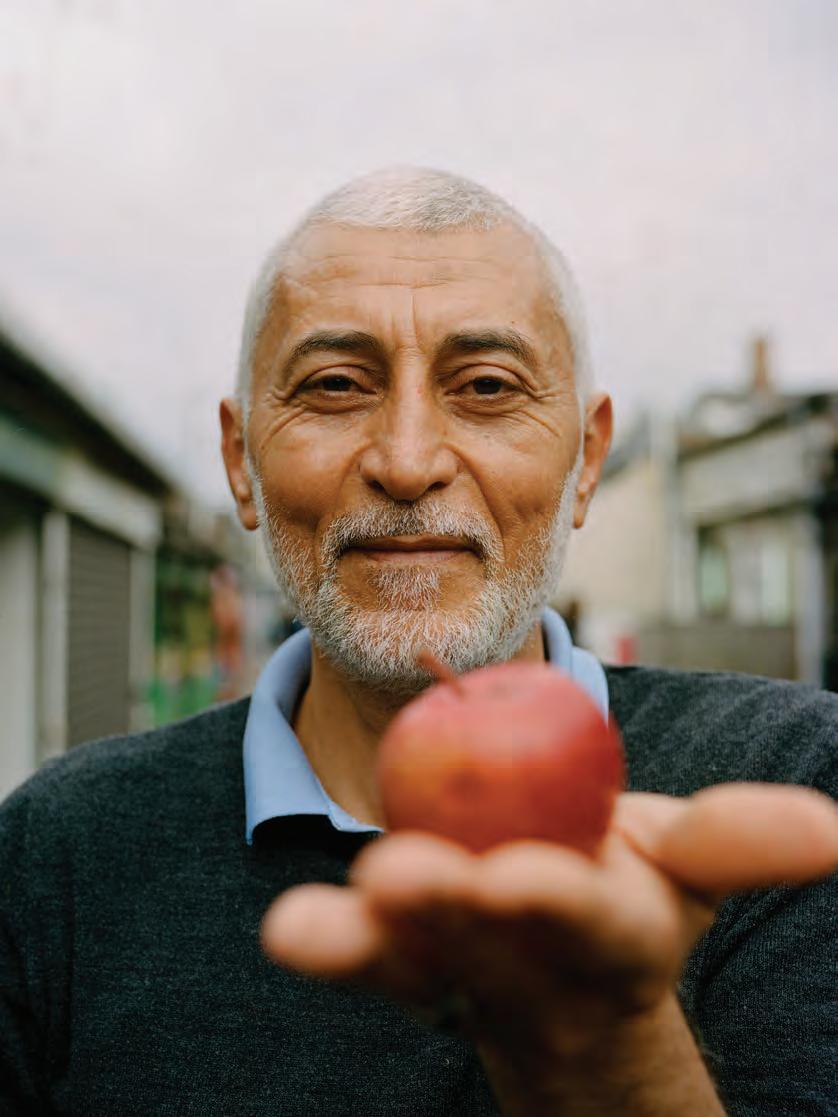
Thank you for picking up a copy of the Bush Bugle, a new local newspaper for Shepherd’s Bush.
Our third edition has given us the opportunity to meet many interesting and inspiring people, businesses and groups.
Nestled among the large, recognisable chains in Westfield London lies the cover star for this issue, Master Bao –an independent Taiwanese spot serving some of London’s best bao buns and street-food favourites. We talk to the founder, Frank Yeung, on page 8.
We also chat to the people behind Petit Miracles, a small but mighty social enterprise that has been changing local lives and protecting the environment for the past 15 years.
Petit Miracles offers work experience, traineeships and business support to vulnerable adults to beat social isolation

BY LUKE G WILLIAMS
The Labour MP Andy Slaughter won the newly created constituency of Hammersmith and Chiswick in this month’s general election.
On a turnout of 61%, slightly above the national average of 60%, Slaughter won 52.3% of the vote – 24,073 votes in total –to romp home ahead of the Conservative candidate, Andrew Dinsmore, who secured the support of 8,783 constituents.
The Green party finished in third place, with 4,468 votes for its candidate Naranee Ruthra-Rajan, just ahead of the Liberal Democrats’ Eraj Rostaqi with 4,292 votes.
Speaking about his victory after the count, which was held in Kensington Olympia, Slaughter welcomed the “huge mandate for change in this country”
and increase employability in the community, by teaching them furniture restoration and upcycling. You can read its story on page 11.
The history of the BBC is synonymous with west London, with Shepherd’s Bush and White City having been particularly pivotal locales in the corporation’s long and illustrious history.
In April 1949, the BBC announced its intention to build a studio facility in Shepherd’s Bush, to be located on 13 acres of land it had purchased just after the war.
In 1953 it purchased the Shepherd’s Bush Empire, a former music hall built in 1903, and renamed it the BBC Television theatre. The corporation used both facilities until 1991.
Our writer Luke G Williams looks at the history of the BBC in the local area on pages 20 and 21.
secured by the new prime minister, Keir Starmer. He said: “We’ve suffered too long from incompetence, from corruption, from people looking after their own interests in that way and it’s only right now that we move on to a new era.” He also thanked the other candidates for “a really decent and civilised election”.
Writing in a guest post on the Chiswick Calendar website five days later, Slaughter added: “It is a huge privilege to have the chance to represent Hammersmith and Chiswick, to support people who are my neighbours and friends and to be a small part of this grand project for national renewal.”
Slaughter was previously the MP for Ealing, Acton and Shepherd’s Bush between 2005 and 2010, before he represented the new constituency of Hammersmith from 2010 until 2024, when further boundary changes saw the creation of Hammersmith and Chiswick.
A trained barrister, he served as shadow justice minister from 2010 until 2016, shadow minister for housing from 2016 to 2017 and shadow solicitor general from 2021 until 2023, when he was dismissed by Starmer for voting in favour of an SNP amendment to the king’s speech calling for an immediate ceasefire in Gaza.
The contest for the neighbouring constituency of Kensington and Bayswater was far closer, with Labour’s Joe Powell ultimately emerging triumphant. He finished just 2,903 votes ahead of the Conservative candidate, Felicity Buchan, who had held the previous seat of Kensington since 2019. Somewhat surprisingly, given its marginal status, turnout was just 54.2%.
As always, we would like to say a big thank you to our talented team who made the latest issue happen, including the designer Laura Mingozzi-Marsh, the photographer Julia Hawkins, the features editor Luke G Williams and all our other contributors who are listed below.
We’re now starting work on the fourth issue of the paper, which will be the autumn edition. We would love to hear your story ideas, so please drop us a line at shepherdsbushbugle@gmail.com if there’s someone or somewhere local that you would like us to feature.
If you run a business or organisation and are interested in advertising with us, please do also get in touch. As you can see from this edition, you’ll be in great company.
We hope you enjoy the issue!
Mark McGinlay and Kate White
Powell said of his victory: “We’ve run a really positive, professional, dedicated campaign focused on the things that people told us on their doorstep. They really wanted to see change in our community and change nationally, so we’re obviously delighted that residents of Kensington and Bayswater have decided to put their trust in us.
“I’m very aware that trust in politics is low in this country at the moment, and that’s because we’ve had too many people who have overpromised and underdelivered.”
Completing a hat-trick of local triumphs for Labour, Rupa Huq won re-election in the constituency of Ealing Central and Acton, finishing with 22,340 votes, a substantial margin clear of James Windsor-Clive of the Conservatives.
Despite her victory, Huq recently wrote in the Guardian of how tough she found campaigning against the backdrop of controversy and debate concerning the Labour party’s position on the conflict in Gaza.
“I was constantly barracked throughout [local hustings] with accusations of genocide being hurled at me despite the fact that I was one of 56 Labour MP Gaza rebels,” Huq said. “I have served on a delegation to Palestine, which is an experience that makes you want to speak up. And I voted for a ceasefire before it was fashionable, ie Labour party policy.”
Huq had the Labour party whip restored in May 2023 after a five-month suspension for comments she made about the Conservative politician and then chancellor of the exchequer, Kwasi Kwarteng.
DESIGNER
PHOTOGRAPHER
After securing Championship survival in the penultimate game of the 2023-24 season, optimism abounds at Loftus Road that Queens Park Rangers can push on next season and – at the very least – avoid another relegation battle.
The appointment of the Spanish coach Martí Cifuentes as QPR manager in October 2023 undoubtedly turned the season around for the west London outfit. Cifuentes inherited a side that, under the previous head coach Gareth Ainsworth, had failed to win in nine league games and were on a run of six successive defeats.
Indeed, when Ainsworth departed, QPR’s position was perilous – they lay a lowly 23rd
in the table with just eight points from 14 games and six points adrift from safety.
Such was the side’s improvement under Cifuentes that they lost just four times in their final 19 games of the season, securing their Championship safety with a game to spare after an impressive 4-0 thrashing of the promotion-chasing Leeds United.
From training to tactics, the Spaniard, 41, revolutionised the club, on and off the field, and won the devotion of the Loftus Road faithful in the process.
“I came here, perhaps I was crazy thinking we could manage the great escape,” Cifuentes reflected after the club secured their safety.
“The atmosphere has been unbelievable since I came here ... [But] there’s a long way to achieve the levels we want to achieve and where this club wants to get to.”
There have been a series of departures and arrivals at QPR since the end of the season. The Ghanaian winger Albert Adomah, 36, is among those leaving the club, having become the Championship’s all-time leading appearance-maker with 525 matches.
Among other players departing the club are the goalkeeper Asmir Begović and the winger Chris Willock, while the French goalkeeper Paul Nardi, the Scotland Under21 centre-half Liam Morrison and the


Brazilian right-back Hevertton Santos are among the new arrivals.
Despite his success last season, Cifuentes has played down any expectations of promotion or a playoff push before the new season begins. Bookmakers largely concur, with QPR rated about a 33-1 shot to win the title.
“We need to be very humble,” Cifuentes told Sky Sports in a recent interview. “There are a lot of good managers out there, a lot of clubs with more money than us. I think it would be naive for us to expect that just because we have a good trend, it is going to work.
“We will lose games. That is football. But I always want the supporters to go home proud of what we were trying to do. The togetherness with the fans has been something incredible. Hopefully, we can keep enjoying it.”
QPR begin the 2024-25 season with a home match against West Bromwich Albion on 10 August.

The Cambridge theatre in central London recently hosted the Jack Petchey’s Speak Out challenge grand final – with a local student crowned the winner.
The evening was packed with original and insightful ideas from the young finalists, with Toby Yates, a student at the Cardinal Vaughan Memorial school and a Hammersmith, Fulham, Ealing and Hounslow (HFEH) Mind youth advisory board member, crowned the champion with his speech, Kindness is Key.
Toby said: “I feel absolutely amazing. It still feels so surreal. Part of me thinks it isn’t

actually happening. Big thanks to everyone who came, it was really great to see all the people that came to support me.”
The competition is sponsored by the Jack Petchey Foundation and is run by Britain’s leading public-speaking and communication charity, the Speakers Trust.
It works with schools and colleges in London and Essex to promote communication skills through expert-led workshops and coaching. Each student receives an all-day public speaking workshop from the trust.
During the training, students are given the skills and confidence to develop and deliver a competition speech on a topic that is important to them. The aim of the training and competition is to amplify young voices.
A speech contest is held at the end of the one-day course and each school selects a speaker to go through to the quarter final. From those 37 students, 15 are then chosen to go to the grand final.
The Cardinal Vaughan Memorial school’s English department worked with the organisation to host a day of publicspeaking sessions, where every student in the fourth form was given the opportunity to speak to an audience about a topic they were passionate about.
Four students were chosen to present their speeches in front of the year group and two were selected to represent the school at the regional finals, one of whom was Toby.


More than 33,000 young people took part in the programme and Toby was one of the final 15 who spoke at the Cambridge theatre. He was chosen by a panel of judges, including the award-winning author Jamila Gavin and Martin Forde KC, as the champion.
A spokesperson from the HFEH Mind youth services team said: “Huge congratulations from us! We are immensely proud of Toby, who has been a core
member of our youth advisory board since 2022 and is one of our trained young advisers who supports us with recruitment, events and panels.
“As part of our co-production team, Toby was directly involved with the creation of the Circle, our children and young people’s youth hub space and cafe in Ealing and supported the youth-led sports workshops at Masbro that took place in spring 2024. We are so proud of you.”

VISIT WESTFIELD SQUARE

Hammersmith and Fulham council has installed more than 20 lights in Shepherd’s Bush Green to make it safer at night.
After requests from local people and businesses, the new lights will better illuminate the central walkway and outer footpaths. They are all fitted with motion sensors.
The lights – added to the rear of existing lampposts – will also improve the area around the war memorial and the playground, as well as the surrounding junctions at Goldhawk Road, Wood Lane and Uxbridge Road.

Cllr Rebecca Harvey, the council’s cabinet member for social inclusion and community safety, said: “These new lights will help deter crime and antisocial behaviour in the area. We’re working with the Metropolitan police and residents to reduce drug dealing and crime, increase safety for women and girls and ensure everyone feels safe around transport hubs.”
The council recently invested £5.4m in a borough-wide CCTV network – with
seven cameras upgraded on the Green. The cameras provide 360-degree coverage to automatically capture any incidents occurring in the area.
Meanwhile, a further six cameras were installed in the Caxton Village neighbourhood north of the Green. Their feeds are monitored 24 hours a day, seven days a week by the central control room, guiding response teams from the Met police and Hammersmith and Fulham’s law enforcement team to the scene of a crime.

Girls Aloud played live to a small audience at O2 Shepherd’s Bush Empire earlier this month, with fans treated to performances of their most-loved hits including Biology and Sound of the Underground.
The singers – who shot to fame in the early 2000s after forming on reality TV show Popstars: The Rivals – performed to a crowd of just 2,000 fans.
The show marked the sixth O2 Priority gig since the series began three years ago. The likes of Kylie Minogue, Sam Fender and D-Block Europe have all performed their own intimate, one-off shows for audiences.
On the night, Girls Aloud entertained the crowd with a jam-packed setlist of No

After the sellout success of last year’s Bush Young Company, which resulted in an Off West End award nomination, the new cohort will take to the main stage of the Bush Theatre this August to premiere two new productions.
Communion by the 18 to 25 company runs from 6-10 August, and the 14-17 company will present The End on 23 and 24 August.
Founded during the disruption of the pandemic, the Bush Young Company has become central to everything the theatre does, reflecting its commitment to local life and developing the next generation of artists.
Lynette Linton, the artistic director of Bush Theatre, said: “Our young companies are at the centre of everything we do at the Bush. In a time of dwindling access to the arts for young people, the pipeline feeding our industry is being eroded. It is vital that we provide pathways and experiences from early years to early careers, and our young companies are already playing a vital role in keeping the ecology alive.
“We constantly talk of our worldclass industry. For it to thrive, we need to develop the next generation of artists, theatre makers, storytellers and audiences. You can’t be what you can’t see.”
Katie Greenall, the Bush Young Company director, said: “The Bush Young Company is not just the fertile ground to develop new artists, but directly feeds into the wider ecosystem of our building. We can see this through the programming of two recent young company members in our new season, and in continued paid writing development opportunities through our Bloom bursary for alumni.
“So often we say that our building exists to platform the artists of tomorrow, but our young company is an example of that mission coming to fruition. I am so excited to present this new generation of these artists to the world, to build on the legacy of what has come before, and to continue to make top-quality, urgent and thoughtprovoking work for our main stage.”

1 hits and fan favourites at what was their first time performing at O2 Shepherd’s Bush Empire.
The evening also saw the group and fans pay tribute to the former Girls Aloud band member, Sarah Harding, who died in 2021 aged 39.
A number of famous faces showed their support at the gig, with Rita Ora, Ashley Roberts, Rylan Clark and Graham Norton in attendance among others.
The Girls Aloud member Kimberley Walsh said: “It was fantastic – to have the opportunity to perform our favourite songs at such an iconic venue and in such an intimate setting with our fans is why we do this. It was a truly special night.”
The local resident and estate agent Robbin Pierce recently sponsored St Stephen’s CE primary school’s summer fair.
Robbin said: “I sponsored the fair, ran the stage for them and coordinated the talent for the day. We had a live DJ and various different acts from the school, including the school choir, martial arts and various student dancers and actors.
“We also had a petting zoo, a tombola, a bouncy castle and much more. I partnered with Joanna Oyediran from Iya London Walks, who created an exclusive St Stephen’s walk for parents and children to highlight local Shepherd’s Bush history for
lucky quiz winners. It was a really fun and successful day with lots of local businesses participating.”

Home to more than 350 shops and restaurants, Westfield London in Shepherd’s Bush is a onestop place where shoppers can find all their favourite big brands.
But nestled among the big, recognisable chains lies Master Bao – an independent Taiwanese spot serving some of London’s best bao buns and street-food favourites, from wok-fried noodles and dumplings to fried chicken and bubble tea.
Established in June 2019, for the past five years Master Bao – with its team of 28 staff – has been serving customers from the shopping centre’s first-floor food court. While the site is small, it shouldn’t be underestimated on a busy day.
Frank Yeung, the founder of Master Bao, says: “It’s a small kiosk, but a pretty big team! It gets very busy. We can do 1,500 meals on a busy day.
“We typically have a five- to 10-minute wait time, sometimes a bit longer in very busy times.”
Before Master Bao was established, Frank first opened his own Taiwanese restaurant, Mr Bao, in Peckham on Rye Lane in 2016, which has expanded in size in the years since.
The family of sites also consists of Daddy Bao in Tooting, created in homage to Frank’s dad, and just this year he opened another Master Bao in Westfield Stratford City in east London, too.
Comparing the restaurant model to the food court “fast food” approach, Frank says: “It’s totally different. The service style has been adapted, so it’s a kiosk and [customers] come up to us and order, get given a buzzer and come back when it buzzes. The seating is all shared, so it’s not full service like the other places.
“In a full-service restaurant you have an hour and a half to two hours to impress people and win them over, from the door – maybe even a conversation on the phone before –then through to the server, the food, then all the interactions every time a plate or drink is brought over.
“In the food court, it’s when you order at the till and when you come and collect, so it’s the little things – a smile, advice when ordering, providing a takeaway box and sauces –just to make a customer’s day better.”
On the menu in Shepherd’s Bush, shoppers can order two bao buns and a side for as little as £12.50 as part of the meal deal, or £14.10 if upgrading to a premium side, and a kids’ meal – a non-spicy chicken bao with chips and broccoli – for £7.20.
The most popular dish is the chicken bao, with the meat marinated for 24 hours and fried, topped with wasabi mayo, house kimchi and coriander.
The other bao bun options are a braised beef brisket bao with pickled mooli and wasabi slaw, a ginger braised tofu version with house kimchi and crispy onions, the “Mr Bao”, which features slow-braised pork, house pickles and roasted peanuts, a prawn option with marinated king prawns, pickled mooli and spiced spring onions and, last but not least, the vegetarian option – shiitake mushroom.

Master Bao serves tasty Taiwanese food from a kiosk in Westfield. Its owner, Frank Yeung, tells how he came to open it
WORDS BY MIRANDA KNOX
The regular side options that customers can choose from are chicken dumplings, vegetarian spring rolls, vegetarian dumplings, chips with wasabi mayo, tenderstem broccoli and edamame beans, while the premium options are popcorn prawns with crispy kale and fried chicken with a smoky miso mayo.
Drinks include the Daddy Bao classic lager, which is made to a special recipe by Brick Brewery, and cocktails on offer include hibiscus sake, as well as soft drinks such as páo páo – a mix of lychee, apple fizz and lemon.
Frank says: “We’ve got rice and noodles, and a couple of other additions bespoke to Westfield – we added a laksa [exclusive to Shepherd’s Bush – chicken and rice noodles in a spicy coconut broth with bean sprouts and herbs, £11.50] after feedback suggested people wanted a soupier dish, and we have bubble teas, too [brown sugar milk tea and iced peach tea, both £4.50].
“There’s some overlap [in Shepherd’s Bush and Stratford] –like the chicken bao, which people don’t want to miss. That and chicken
noodles – you can’t stop people ordering chicken!”
It’s a very different model to the fullservice restaurant atmosphere Frank is accustomed to.
Growing up in Salisbury, he was introduced to hospitality very early on through his restaurateur father, Joe Yeung, who is originally from Hong Kong.
Frank says: “He came to the UK in 1975, worked three jobs at the same time for 10 years to save up, and then when he had enough money he opened his own Chinese restaurant in 1985, when I was 10 months old.
“It was called the Jade restaurant, in Salisbury. At the time it was groundbreaking as there were live lobsters, live crabs, live oysters –everything! It was absolutely crazy, fresh every day and cooked straight away. It was always packed, and then he sold it. He retired in 2017, and that’s why we opened Daddy Bao.”
It was not a career Frank ever saw himself pursuing when growing up.
He says: “I thought, ‘God my dad works hard, I need to do something else!’ I couldn’t get away from it though, I just love it too much.
“We ate out a lot as kids because my dad liked to spend his spare time doing that. From that you learn how to analyse a restaurant.”
Before going into hospitality, Frank gained a master’s degree in mathematics and physics from Oxford University, and then worked for Goldman Sachs as an investment banker until 2009.
He says: “I knew at some point I had to go back into hospitality – my heart wasn’t in [my job].”
Given his upbringing, it’s not surprising therefore that Frank eventually decided to open his own place – and as a child they lived above his dad’s restaurant.
Frank says: “That’s how I knew how hard he worked. I’d open the fridge and there’d be a live crab in there –I’m not even joking!”
Frank initially set up a Mexican restaurant called Poncho 8 and opened eight sites over five years, before selling his stake. He set up Mr Bao in 2016 with his friend Nick Birkett, whom he later bought out, and now he runs it with his long-time friend Abhi Malde.
The Peckham restaurant underwent a significant refurbishment during the first lockdown in 2020, expanding from 44 seats to 65.
At the original site, customers can choose from a menu consisting of six main bao bun options.
These are accompanied by a selection of small sharing side dishes, including smacked cucumber, sticky barbecue corn ribs, golden kimchi, sesame spinach, dumplings, fried chicken and sweet potato chips, and every other week there’s a range of specials, too.
Daddy Bao on Mitcham Road in Tooting followed a few years after the first site was set up.
Then, explaining how the opportunity to work with Westfield in Shepherd’s Bush came up in 2019, Frank says: “We’d been offered the space through a regular customer at Daddy Bao in Tooting.
It’s the little things – a smile, advice when ordering, providing a takeaway box and sauces – just to make a customer’s day better
“We were initially really hesitant about it and weren’t quite sure, but decided to go for it [as we wanted] to make food-court food better, and add a bit of hospitality back in where it’s perhaps sometimes lacking generally.
“It was something totally different. It wasn’t a full-service restaurant, so we were nervous, but we haven’t looked back, and we have just opened a new one in Stratford, which we’re really excited about.”
It’s a move that has really paid off, with customers flocking to each of the sites across London.
Frank says: “Lots of people eat in Peckham and then come to Westfield and vice versa, so it’s ended up being excellent and we love this service model as much as the full restaurants. We’re always trying to improve.”
In terms of what’s next, Frank adds: “We’re not looking to open any more of the same – a Mr Bao or Daddy Bao – but we’re planning to open more one-offs. We have a restaurant in development called Cafe Kowloon, so we’ve just been over to Hong Kong – it will be modernised Hong Kong eating, maybe at a site in Hackney.”

Yeah, you’ve tried flatbreads... But have you tried Naz’s flatbreads?
directions.










In the heart of Shepherd’s Bush, a small but mighty social enterprise has been changing lives and protecting the environment for the past 15 years.
Petit Miracles offers work experience, traineeships and business support to vulnerable adults to beat social isolation and increase employability in the community, by teaching them furniture restoration and upcycling.
Support and training are provided by a dedicated team of training staff, interior designers and volunteers who teach participants design and DIY skills.
All furniture restored by the charity is secondhand and has been diverted from landfill with the help of donations from the public and the charity’s partnership with the West London Waste Authority.
After being transformed into affordable, bespoke pieces by the participants and volunteers, the furniture – ranging from antique dining tables to vintage cinema seats and bedside tables – is then sold in the charity’s very own shop, located on the Green, and online through its website.
Since its inception, Petit Miracles has taught traditional, hands-on skills to a wide range of people including young and vulnerable adults. As well as gaining practical skills, participants are able to nurture their creativity, improve their employability and build their own social networks.
Any London resident can selfrefer and support is tailored to each individual’s specific needs and experiences.
I sat down with the charity’s director, Kate Moore, who joined the team in 2014 as an apprentice and now oversees the day-to-day running of the charity – as well as teaching upholstery courses for participants and members of the public – to hear more about its brilliant work.
“Lots of people in our society feel disenfranchised,” Kate tells me. “For too many people, there just aren’t enough opportunities. So, we set up this charity specifically to support people who are farthest from the job market.”
The charity provides “a safe space for adults with barriers to education, employment and further education to receive support and training”, Kate explains.
“Participants undertake a four- or 12-week traineeship and everyone who comes through this project learns valuable hands-on skills including woodworking, restoration, painting techniques and upholstery. There is such a wide range of experiences on offer to people,” she tells me.
Any money raised from selling the restored furniture goes back into the project. “The more that we sell, the more work we can do to help people in our community who need that support,” Kate says.
“We don’t have a huge marketing budget or staff team like other organisations. So, we really rely on the support of the community, of people coming in and buying our products.”

Petit Miracles teaches people how to restore furniture to beat loneliness and boost employability. We find out more
WORDS BY CAITLIN
One participant I spoke to told me that after completing training and receiving support from the staff at Petit Miracles, they successfully applied for further education and will begin their new course in a few months.
“Petit Miracles has given me a lot more confidence in working with furniture and with problem solving,” they said. “Everyone at the charity is very nice and it’s always a lot of fun.”
It is clear that the small team is having a big impact and has built a community that is open, encouraging and dedicated to bringing about positive change.
Kate agrees. “Both the workshop and the shop foster a real sense of community, where participants feel welcome and valued, which
OTWAY
is something the team is actively committed to providing.”
Petit Miracles also offers a host of workshops for members of the public to learn new skills. “Our workshops are open to everyone,” Kate tells me. You need to pay a small fee to attend. “But that means that everything else that we deliver, for our beneficiaries, is completely free, which is really impactful.”
Ranging from beginner to expert level, the workshops offer the opportunity to learn about upholstery and furniture restoration and the practical skills needed to upcycle your own furniture at home.
As well as furniture restoration, the charity’s retail shop is also home to its market programme. “We noticed that as the confidence of people who

took part in the traineeship started to increase, and their mental health improved, some were keen to branch out and try new things on top of the furniture upcycling,” Kate explains.
“So, we decided to expand our support to give participants the chance to do their own thing with their own businesses.”
As a result, the Petit Miracles team now offers support to local entrepreneurs by providing free space in its shop to showcase their products. They sell jewellery, natural fragrances, bags, purses and crocheted gifts, all made by local businesspeople.
The team also trains would-be entrepreneurs in digital skills and social media use as well as running monthly business workshops, providing access to mentoring and organising business talks, which allow entrepreneurs to test new ideas, build up their business models and meet other creative people.
One local entrepreneur, who received help from the Petit Miracles team to create a new website, said the support of the charity has given them “the confidence and motivation to push forward with my goal to get my company into the mainstream market”.
“Whenever we see someone struggling with something, we hone in on that and provide bespoke support,” Kate says. “For example, we found that people were struggling to use Instagram for their businesses, or struggling to work out pricing, so we provided support and training on how to do that.”
The more we sell, the more work we can do to help people in our community who need that support
I ask Kate how the local community can support the charity. “We would love to have more people on board,” she says. The team relies on volunteers to support the workshop and shop, and many team members have participated in the training programme themselves.
“We are always on the lookout for local volunteers to support the team; plus, you can gain such valuable experience and meet new people from your community,” Kate says.
But volunteers don’t just need to be interested in running a hands-on workshop. “People can support us in other ways, for example offering expertise in marketing or digital skills, or any other skill that may help people to grow their own business,” Kate explains.
Beyond volunteering, buying furniture from charities such as Petit Miracles rather than buying new is a great way to live more sustainably.
The charity has so far diverted tens of thousands of kilos of unwanted, unused furniture from landfill and the team is always on the lookout for donations of high-quality furniture, particularly if you can deliver the item directly to the workshop.
So, if you would like to help out or you’re in the market for some new, bespoke furniture, why not drop in to see the team?
Or if you or someone you know would like to know more about the support on offer and you are in receipt of state benefits, pension, or consider yourself vulnerable or disadvantaged in any way, the team at Petit Miracles can help.
PHOTOS BY JULIA HAWKINS
The origins of the name Shepherd’s Bush are obscure. The name may have originated from the use of the common land as a resting point for shepherds on their way to Smithfield Market in the City of London.
There appears to have been an ancient custom of pruning a hawthorn bush to provide a shelter for shepherds, protecting them from the elements as they watched their flocks.
Alternatively, the Green may simply be named after a local landowner. In any event, in 1635 it was recorded as “Sheppards Bush Green”.
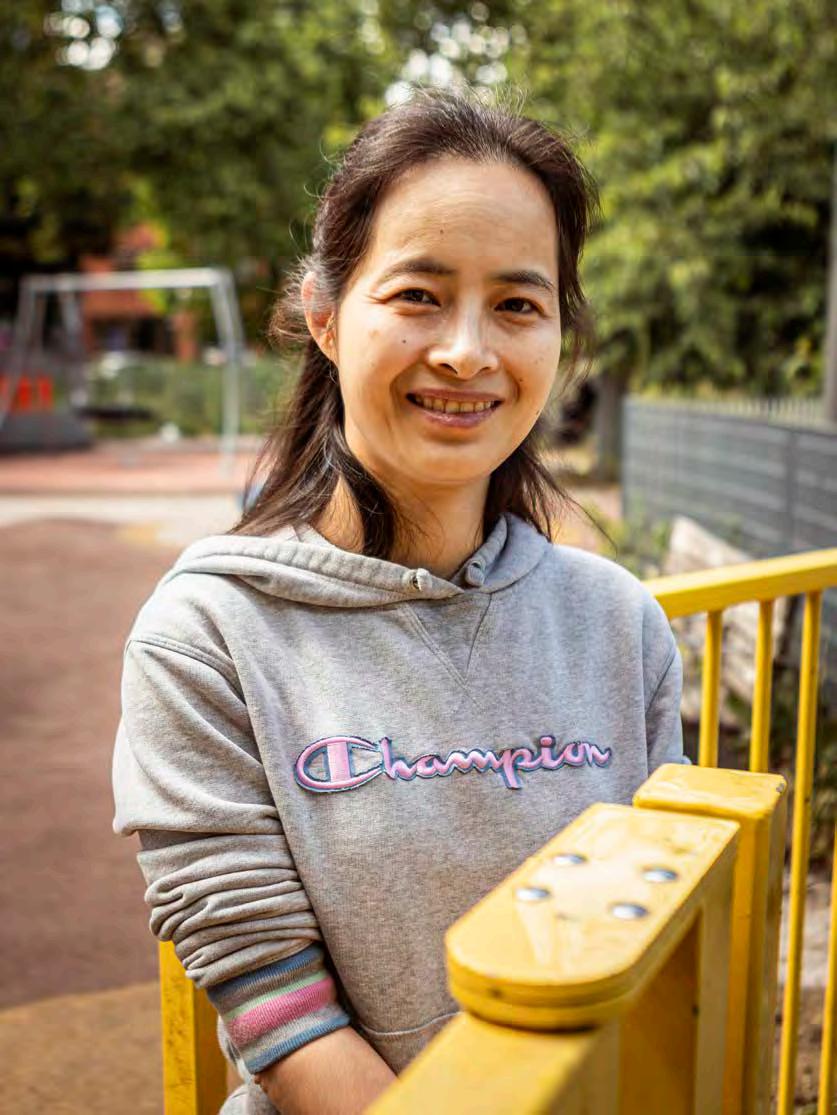


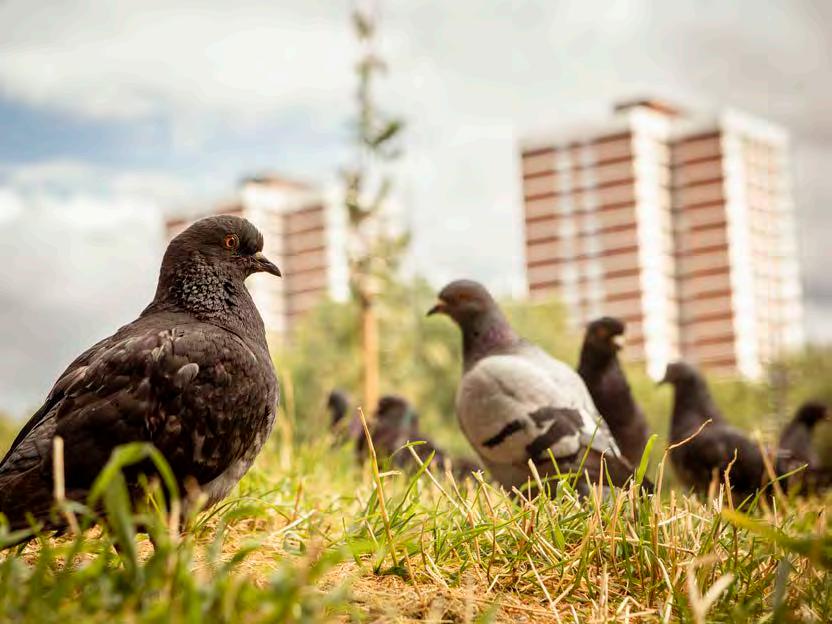
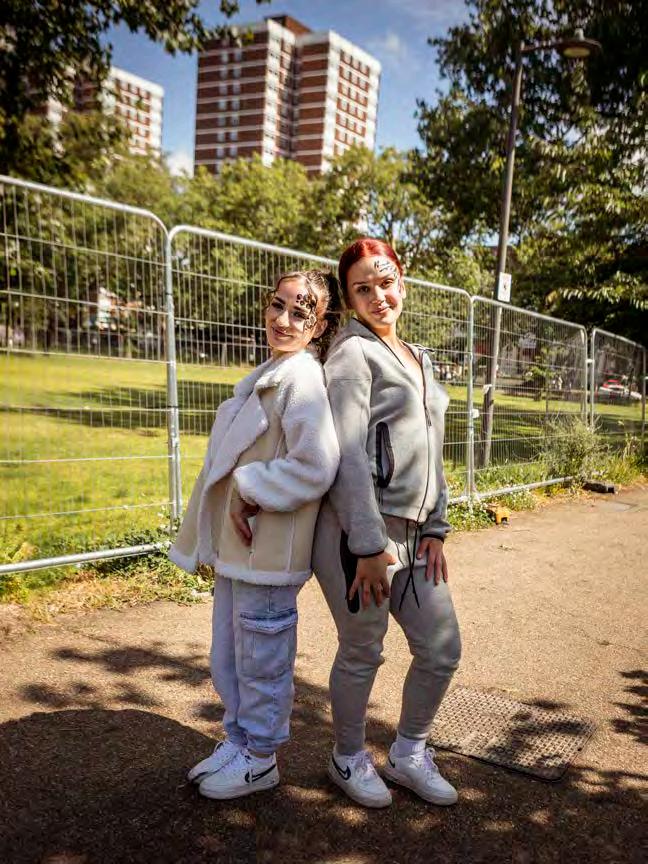
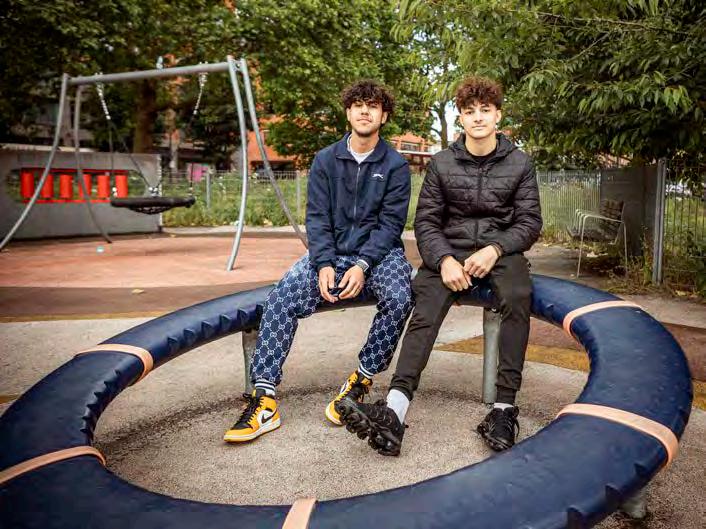

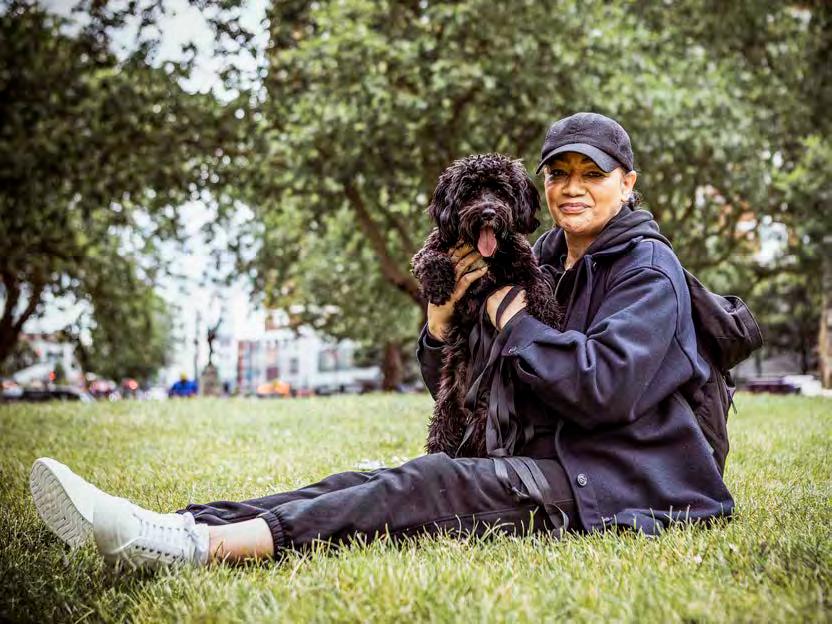
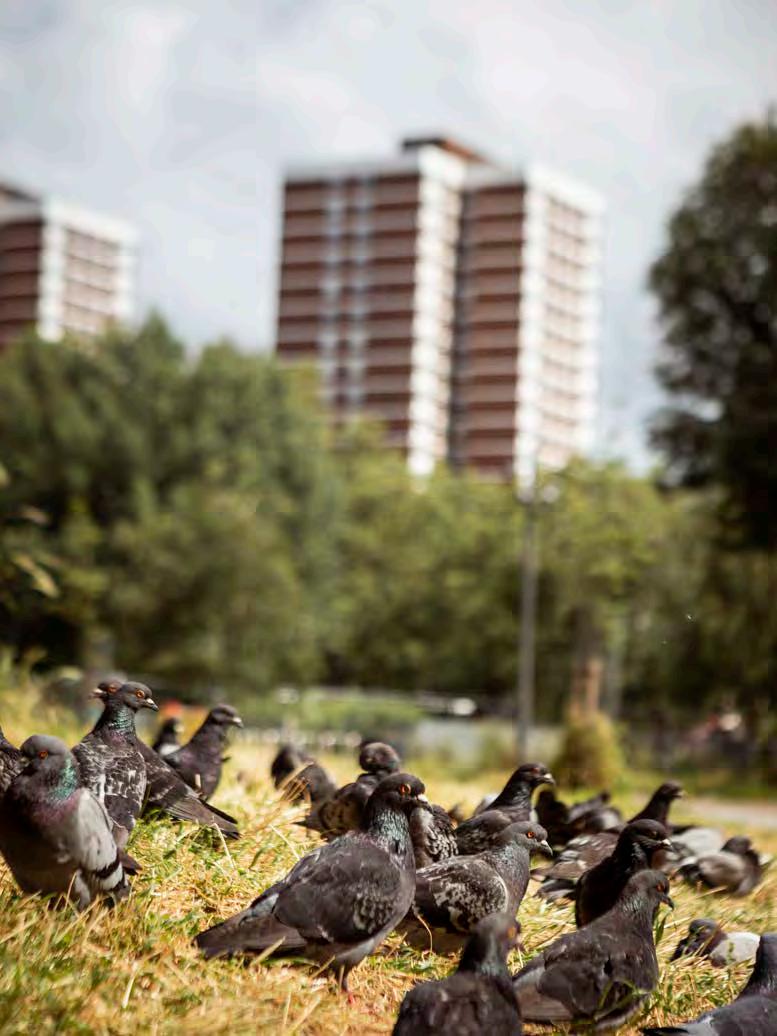
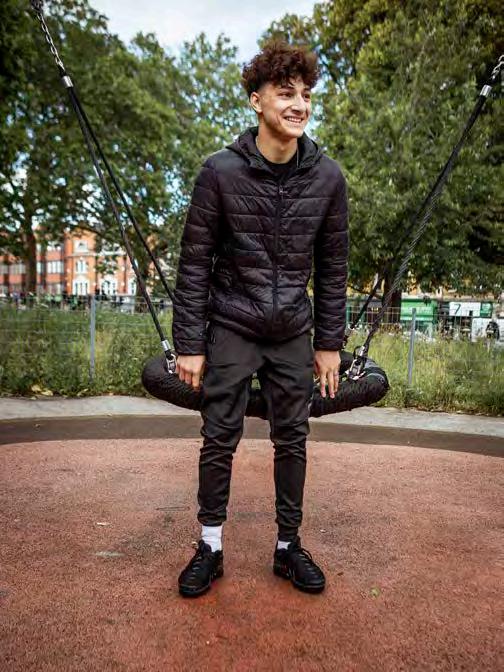





The Market Academy helps budding businesspeople get their ideas off the ground. We find out more –and meet local trader Steve Gupta
WORDS BY MIRANDA KNOX
You’d be hard pushed to find a market steeped in a richer and more interesting history than Shepherd’s Bush, and this summer marks a staggering 110 years since it first opened just before the first world war, in June 1914.
After the conflict finished, the market reopened again in 1918 as soldiers returning from the western front were offered stalls to help restart their lives, and needless to say, a great deal has changed over the decades since.
A relatively recent initiative that has been met with plenty of praise is the Market Academy, a popular project set up in the market in 2023 to provide free training and workshops for traders and people with new business ideas.
The support offered is free, for new entrepreneurs with a business plan who meet the criteria and for existing traders paying rent.
Reimagine is the team responsible for managing the day-to-day operational matters on-site in the market, and it also runs the academy.
The community manager, Alecia McWhirter, has worked there since
April 2023, and one of her main priorities is the academy.
She says: “I help create partnerships with people around the community and different organisations and am the face the traders can come to with any sort of queries or any questions. The academy is my main priority really. I manage the pop-ups and new traders, as well as existing traders who need a bit of additional assistance.”
For those interested in launching their own business and becoming a new trader, a 20-minute drop-in session is held every Friday at 3pm in arch 186.
Alecia says: “It’s quite relaxed, and those who attend give us their business idea and then we explain the help we can offer and the whole process of the academy and the stages there are.
“The message we want to get across is no matter how small an idea you think it might be, just come to a drop-in session as you never know what it could turn into.
“We help make the idea a reality and give traders that market experience, as you can have a business idea on paper but you don’t always know how it’s going to go until you’ve lived it.”


There are several stages to the process, and once traders are approved and meet the initial criteria, they have a one-to-one meeting where they are provided assistance with business plans and advised on matters such as profit margins and suppliers.
Alecia adds: “I don’t know of any other place where you get this much in-depth on-site help to make your business something when you have no experience. Even if it’s not an idea that’s fit for this market, you’ll still get the help from us and the team.
“The whole model of the academy is to help these business entrepreneurs work up to a place where they can be confident enough and ready enough to take their business elsewhere, too, maybe to somewhere bigger, another market or to events – that’s what the academy focuses on,” she adds.
“We want to help them build themselves up to a point where they can confidently go anywhere and be successful.”
The director of finance and operations, Rob Machin, adds:
“It’s all about starting a business in general, not just starting a business in Shepherd’s Bush Market. It’s about helping people realise their entrepreneurial ideas.”
Owing to the refurbishment of the market that is planned by Yoo Capital, traders coming through the academy are offered pop-up or short-term lease agreements, with “unique plans” being made for each trader potentially affected by the works.
The trader Steve Gupta, 44, runs family business Teeya’s Hair & Cosmetics in arch 187. He has been trading at the market for nearly 20 years and has benefited from the support provided.
He says: “I was a young man when I started – I’m middle-aged and grumpy now! The market has changed a lot over the years, admittedly not always for the better, as it has quietened down. Continued overleaf...
“In fact, when I first came in my stall neighbours told me it was dying, although I thought it was pretty good back then, and we were constantly busy.
“It’s just changed over time, and that can scare people understandably as everyone worries if their business will survive, but I am a huge advocate for the development, because I think the market needs investment and I feel we have the advantage of being here, and seeing what the change will be and adapting.
“I don’t have to move away from cosmetics, I just need to foolproof my business to develop as the market does.”
Despite owning an already established and successful business, Steve has still benefited from support provided by the academy to market and promote Kemi Oyl, his own product that is a blend of 10 natural oils including argan, coconut and sunflower.
He says: “For me it’s been all about helping this old dog learn some new tricks.
“You become set in the way you run your business, and for me I’ve always grown up in the cosmetic and beauty business so it can be hard to change your ways.
“If you visit the stall you’d think it was like Aladdin’s cave – there’s so much going on!
“With the academy it was interesting as with the Kemi Oyl, they helped create some mood boards and we started thinking about how we could promote it as more of a premium product as it’s not cheap –the 250ml bottle is £29.99 and the 100ml bottle is £19.99, because of the ingredients that go in it.
“It’s not heavy, it’s not sticky and it smells beautiful. You can use it for hair, for skin – I always joke with customers that as long as you’re not cooking with it, you can pretty much use it for anything! We have a manufacturer who makes it to our specifications.
“The academy helped me see ‘less is more’, which I had great difficulty understanding initially because for me, I’ve always had the mentality of pile the products high and sell it cheap!”
For Steve, the support has been invaluable, and he says the academy’s help has produced “significant” results.
He says: “The academy explained I was undervaluing myself so the stand outside the arch now, it’s very simple. It’s a metal stand, with literally two bottles of the oil out.
“People now walk past and stop, whereas if it was cluttered I think people would just walk past as there’s too much noise.
“It works, and the sales have significantly increased.”

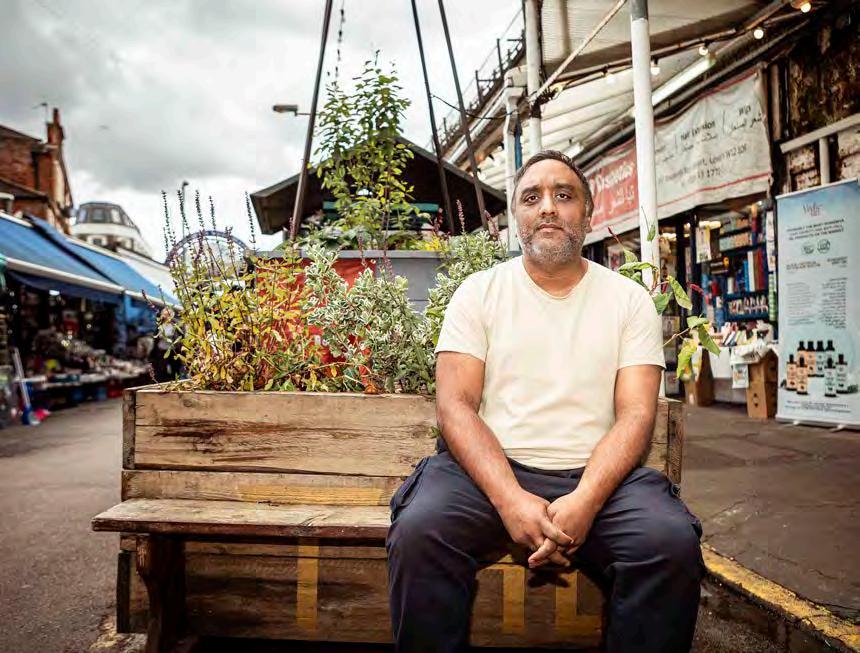
For
me it’s been all about helping this old dog learn some new tricks. You become set in the way you run your business, and for me I’ve always grown up in the cosmetic and beauty business so it can be hard to change your ways
The business has been in Steve’s family for generations, after being set up by his grandparents in the 1960s.
Steve says: “They moved over to the UK from India in 1959. My grandad worked for the Indian diplomatic service, and my grandmother thought, ‘This is the Swinging Sixties, I don’t want to leave!’
“So they stayed and she started making wigs by hand and then they started a shop in Willesden and we got into wholesale and retail.
“This shop then became available about 20 years ago. It was owned by
someone we supplied, I believe. They offered it to our family to take on and it’s served me really well.
“In terms of the future, I’m looking forward to it, but it is unknown,” he adds.
“As developers go, we’ve had a few in and I’ve always felt a little pushed around and not always listened to, but with Yoo Capital I personally have felt we’ve had a listening voice. There’s a team on the ground and you can speak to who you need to.
“I’m quite excited about the future of the market.”



























TWe take a look at the BBC’s long links to the local area
WORDS BY LUKE G WILLIAMS
he history of the BBC is synonymous with west London, with Shepherd’s Bush and White City having been particularly pivotal locales in the corporation’s long and illustrious history.
From 1935 through to the 1940s, Alexandra Palace in north London was the main production base for BBC television broadcasts. However, the
corporation had also been using up to 40 other “widely scattered” premises across London for its television and radio output.
Eager to centralise and simplify its operations, and with the demand for television production growing steadily after the war, BBC mandarins had long considered the possibility of constructing a purpose-built television studio.
On 1 April 1949, the corporation publicly announced its intention to build such a studio facility in Shepherd’s Bush, to be located on 13 acres of land it had purchased just after the war that had originally been the site of the 1908 Franco-British exhibition in White City.
On announcing the plans at the Television Society’s annual dinner, Norman Collins, then the controller





of BBC Television, promised the new facility would be the largest television centre in the world, as well as the first purpose-built television complex in Britain – a “television factory” with the stated aim of producing 1,500 blackand-white television programmes in a year.
By 1950, plans for the new television centre had been drawn up by the architect Graham Dawbarn, whose “precise and mathematical mind” had conceived of a building that – from a bird’s-eye view – would resemble the curved shape of a question mark.
It was a design that Dawbarn correctly foresaw would allow for the free flow of people, technical equipment and scenery between the seven planned studios surrounding a circular, central court.
Due to postwar government restrictions, building work on the television centre soon stalled and when work did finally resume in 1953, progress was slow. With a quicker solution needed to the rapidly expanding demand for TV production space, and Alexandra Palace unable to cope, the BBC purchased Lime Grove Studios for £230,000 in 1949 as a much-needed extra production base.
Built by the Gaumont Film Company in 1915, the transfer of many BBC productions to Lime Grove was originally intended to be a temporary solution while waiting for the television centre to be completed.
In 1953 the corporation made a further move into Shepherd’s Bush by purchasing the Shepherd’s Bush Empire – a former music hall built in 1903 – and renaming it the BBC Television theatre. So successful

would the BBC’s tenures at Lime Grove and the Empire become, that the corporation would end up using both facilities until 1991.
Among the plethora of programmes made at Lime Grove were Andy Pandy, Dixon of Dock Green, Doctor Who and Panorama. From 1966 until 1969, Lime Grove also hosted Top of the Pops, while in 1983 it was chosen as the broadcast base for the BBC’s newly launched Breakfast Time programme, originally hosted by Frank Bough, Selina Scott and Nick Ross.
Meanwhile the BBC Television theatre was making history of its own, quickly becoming synonymous with the BBC’s light entertainment and musical output. It hosted Crackerjack, The Generation Game and Juke Box Jury among others, before being used for the thrice-weekly Wogan chat show from 1985.
The BBC left Lime Grove in 1991, and the studios were eventually knocked down to make way for new housing.
By then, the BBC Television Centre had long supplanted it as the facility most associated with the BBC. However, many of those who worked at Lime Grove still harbour fond memories of the facility.
Martin Kempton, a television lighting designer who worked there in the late 1970s and early 80s, captured Lime Grove’s unique appeal, describing it as “a higgledy-piggledy rabbit warren of corridors, staircases, fire escapes and studios, apparently piled on each other in random order”. Despite its outwardly chaotic structure (“you could easily get lost!”) Kempton admitted of Lime Grove that

it “seemed magical and full of hidden secrets”.
The BBC Television Centre eventually opened in June 1960. It had taken over a decade for Dawbarn’s vision to become a reality, but the final result did not disappoint, placing the BBC at the vanguard of television technology.
It also proved aesthetically satisfying and architecturally iconic, with a dramatic statue of Helios, the Greek god of the sun, designed by TB Huxley-Jones, placed in the outdoor circular court of the centre’s main block, with two additional figures at the foot of the Helios statue representing the televisual elements of sound and vision.
Admiringly described by one contemporary newspaper as “the Pentagon of showbusiness”, the BBC Television Centre cost an estimated £9m and construction of the main block alone had required 8m bricks, 55,000 tonnes of concrete and 4,300 tonnes of steel.
It quickly proved a worthwhile investment, however, serving as the host studio for many of the BBC’s most famed programmes and productions and also fulfilling Dawbarn’s original intention of practicality.
As Roger Bunce, a BBC cameraman from 1965 until 2001, put it, the television centre was “a building that was incredibly efficient at making TV programmes”.
He added: “A lot of the magic lay in the ring roads round the back, that the average punter wouldn’t have seen. There were two consecutive ring roads, an inside one and an outside overtaking lane which were
Lime Grove was a higgledypiggledy rabbit warren of corridors, staircases, fire escapes and studios, apparently piled on top of each other in random order
used to bring scenery and technical equipment into the backs of the studios.”
As well as proving a highly efficient production space, the BBC Television Centre also became a recognisable landmark, often being used as a backdrop for outside BBC broadcasts.
Described on its opening as “preeminently practical”, the television centre remained a work in progress for many years, evolving, shifting and expanding to suit the changing demands of the television industry. In 1985, for example, after the demolition of White City stadium, the BBC built a new Media Village, later renamed White City Place.
By 2007, however, the BBC – facing financial difficulties – announced that it was scaling back its property portfolio and that the BBC Television Centre would be sold. In 2012, Stanhope plc bought the site for £200m. By March 2013, the BBC had officially “left the building”, with its news and radio services having all relocated to Broadcasting House in central London.
Above, from left: Terry Wogan; Peter Capaldi filming Dr Who; a BBC 1960s mobile control centre. Below and opposite: the BBC Television Centre
This was, however, not quite the end of the BBC story in west London. In 2017, BBC Studioworks, having worked in association with Stanhope, reopened three redeveloped studios at the television centre site, with ITV’s daytime programmes also moving there.
Its demise having been delayed, perhaps for another generation at least, in 2020, the television centre turned 60 years old. It’s a facility that has evolved and changed with the times, but its magic remains very much alive.


Goldhawk Road’s name derives from John Goldhawk, who in the late 14th century owned extensive estates in Fulham.
machine with muskets fixed to a frame. His plan failed and he was sentenced to death. His cottage was demolished in the 1760s.
6 Across is a famous person from Shepherd’s Bush.
ACROSS
6 NUMB OX DATA (anagram) (4, 6)
9 Sicken (8)
10 Brave, bold (6)
11 Rapacious money-lending (5)
12 Remiss, careless (9)
14 Author of The Hobbit (7)
16 Instance, case (7)
18 Brainpower (9)
20 Evade, dodge (5)
21 Royal seat (6)
22 Residence, home (8)
24 Going off-topic (10)
1 Seldom (6)
2 Self-denial, restraint (10)
3 Chopper (3)
4 Da Vinci portrait (4, 4)
5 Phrase that’s tricky to say (6-7)
6 Normally, in the regular way (2, 5)
7 Bishop’s title (5, 8)
8 Green citrus fruit (4)
13 B&B, small hotel (10)
15 Chicago’s state (8)
17 Stopping for a moment (7)
19 Rotate (4)
20 Bring out, evoke (6)
23 Weep, sob (3)
Reverend, 8 Lime, 13 Guesthouse, 15 Illinois, 17 Pausing, 19 Turn, 20 Elicit, 23 Cry.
1 Rarely, 2 Abstinence, 3 Axe, 4 Mona Lisa, 5 Tongue-twister, 6 As usual, 7 Right
16 Example, 18 Intellect, 20 Elude, 21 Throne, 22 Domicile, 24 Digressing. DOWN:
ACROSS: 6 Adam Buxton, 9 Nauseate, 10 Daring, 11 Usury, 12 Negligent, 14 Tolkien,

The thoroughfare was of little note until the mid-17th century, when a cottage on the street became the home of Miles Sindercombe, a Roundhead who, in 1657, made several attempts to assassinate Oliver Cromwell.
Sindercombe planned to ambush Cromwell using a specially built
A map of London dated 1841 shows Goldhawk Road forming the southern boundary of Shepherd’s Bush Green. At that time Shepherd’s Bush was still largely undeveloped and chiefly rural in character, with much open farmland compared with fast-developing Hammersmith, and several ponds or small lakes.
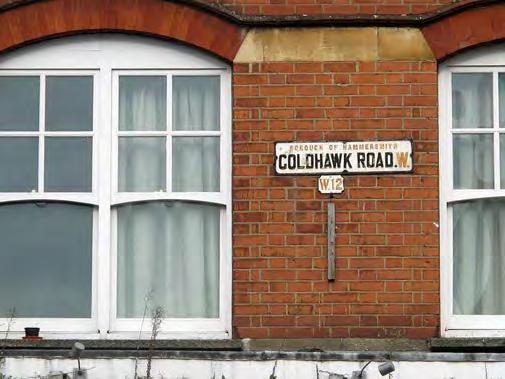
In Daphne du Maurier’s Rebecca, the character Mrs Danvers reveals that Dr Baker lives at “165 Goldhawk Road, Shepherd’s Bush”. In the track Love is a Bourgeois Construct from their 2013 album Electric, Pet Shop Boys reference Goldhawk Road: “I’ve been hanging out with various riffraff, somewhere on the Goldhawk Road, I don’t think it’s gonna be much longer till I’m mugging up on the penal code.”
The actor Ophelia Lovibond grew up in Shepherd’s Bush in a single-parent family. Her mother worked as a chartered psychologist at Wormwood Scrubs prison.
Lovibond studied at Latymer Upper School on a scholarship. She also attended the Young Blood theatre company, a drama club for young people in Hammersmith. She graduated from the University of Sussex with a degree in English literature in 2008.
Lovibond made her film debut in Roman Polanski’s Oliver Twist in 2005. A part in the John
Lennon biopic Nowhere Boy followed. She played a leading role in the film 4321, and had roles in the films London Boulevard, No Strings Attached and Mr Popper’s Penguins. Lovibond played Teri in the BFI and BBC film 8 Minutes Idle, based on the award-winning novel.
She is perhaps best known for her roles as Carina in the film Guardians of the Galaxy, Izzy Gould in the BBC’s W1A, Patty Failure in Timmy Failure: Mistakes Were Made, Joyce Prigger in Minx (pictured left), and Kitty Winter in Elementary.
An enchanting clothbound fable from the author of The Fox and the Star

‘Another triumph! ’
Yuval Zommer author of The Big Book of the Blue
‘ Exquisite , moving and hopeful ’
Lucy Jones author of Losing Eden

Pigment Press is a new community screen printing studio in Shepherd’s Bush Market , Arch 182 .
Come and create with us at one of our print workshops . Use code PIGMENT25 for 25% off all workshops
Thursday 8th & 22nd August
T-Shirt Printing Workshop
17:00pm - £60
Wednesday 21st August
Block Printing Workshop
11:00am - Free
Wednesday 21st August
Block Printing Workshop
14:00pm - Free
Saturday 21st September
Fabric Repeat Print Workshop 10:00am - £60
Saturday 28th September
Stencil Printing Workshop 11:00am - Free
Saturday 28th September
Stencil Printing Workshop 14:00pm - Free
Saturday 19th October
T-Shirt Printing Workshop 10:00am - £60
Saturday 31st October
Childrens T-Shirt Printing 11:00am - Free